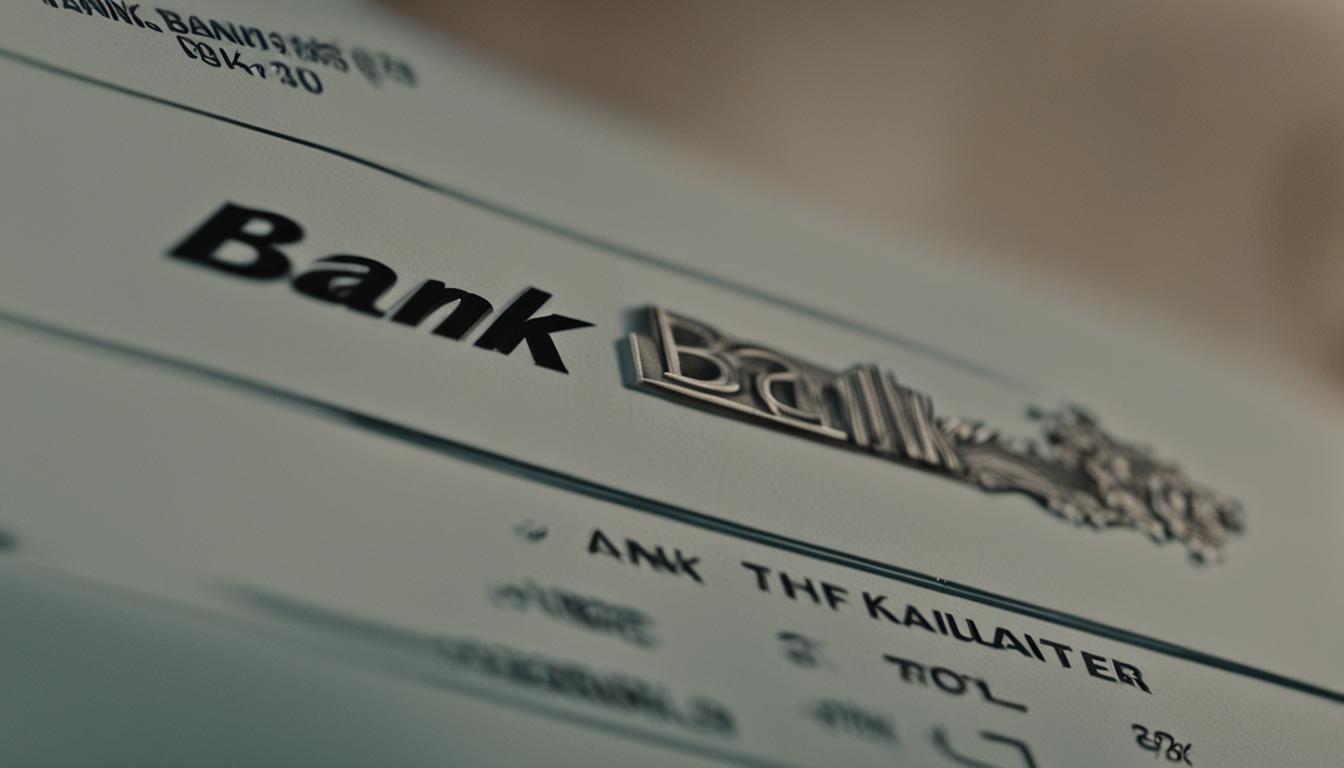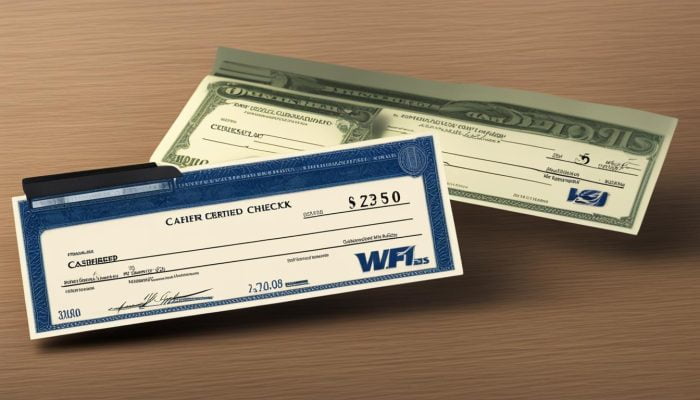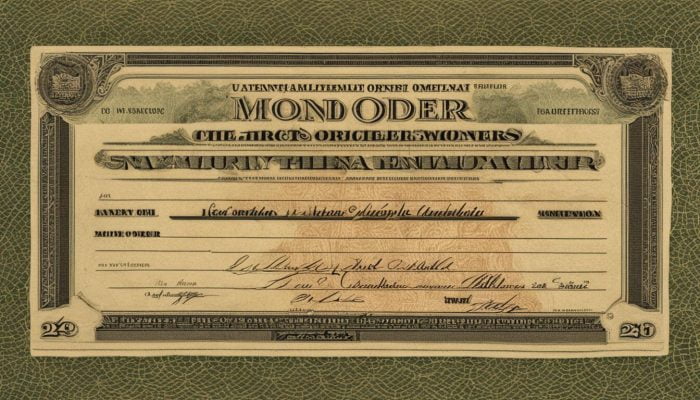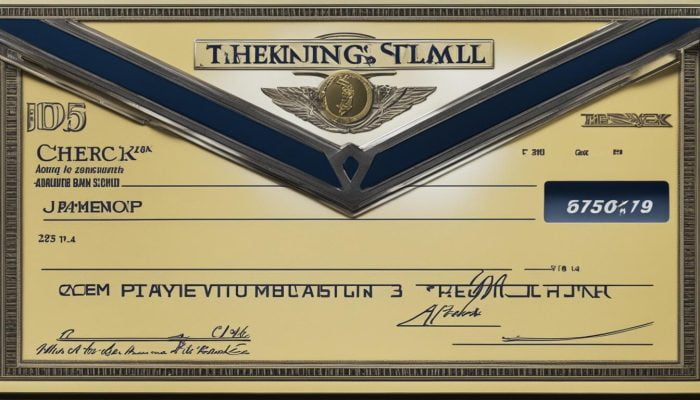A cashier’s check is a secure way to make large transactions, backed by a bank or credit union. It is different from a personal check because it is drawn from the bank’s account rather than your own. To cash a cashier’s check, you can go to the issuing bank, a bank or credit union where you have an account, or a check cashing store.

Key Takeaways:
- Cashier’s checks are a secure method of payment for large transactions.
- You can cash a cashier’s check at the issuing bank, your bank or credit union, or a check cashing store.
- Be cautious of cashier’s check fraud and scams, and always verify the authenticity of the check before accepting or cashing it.
- Consider online options and mobile apps for convenient cashier’s check cashing.
- If you don’t have a bank account, check cashing services may be an option, but they often charge high fees.
What is a Cashier’s Check and How Does it Work
A cashier’s check is a check issued by a bank or credit union that acts as a middleman in a transaction. It allows for the transfer of funds from your account to the bank’s account, and then the bank issues a check to the person you want to pay. This process ensures the availability of funds and allows the payee to receive the money faster compared to a personal check.
When you request a cashier’s check, the issuing bank deducts the amount from your account and holds those funds. The bank then guarantees to pay the funds to the payee when the check is presented for payment. This means that the payee can be confident that the funds are available and that the check won’t bounce.
Unlike a personal check, which is drawn from your own account and relies on your account balance, a cashier’s check is drawn from the bank’s account. This provides an additional layer of security and makes it a preferred method for larger transactions or when the payee requires immediate access to the funds.
| Cashier’s Check | Personal Check |
|---|---|
| Issued by a bank or credit union | Drawn from your own account |
| Guarantees availability of funds | Depends on your account balance |
| Fastest way to transfer larger amounts | Can take time for funds to clear |
Overall, a cashier’s check provides a secure and reliable method for transferring funds. It ensures the availability of funds and offers peace of mind to both the payer and payee. If you need to make a large transaction or want to guarantee the availability of funds, a cashier’s check is an ideal choice.
Getting a Cashier’s Check
When you need to obtain a cashier’s check, there are a few steps to follow. First, make sure you have enough money in your account to cover the amount you want to transfer. The bank will typically require that the funds be available in your account before issuing the cashier’s check. This ensures that the check won’t bounce and allows for a smooth transaction.
Next, you’ll need to provide the bank with the payee’s name. This is the person or entity who will be receiving the funds. Make sure you have the correct spelling and any necessary additional information, such as an account number or reference number. Providing accurate information will help prevent any delays or complications when the payee tries to cash or deposit the cashier’s check.
When you go to get a cashier’s check, it’s important to bring a valid form of identification. This helps verify your identity and ensures that the check is being issued to the correct person. Valid forms of identification typically include a driver’s license, passport, or state-issued identification card. The bank may also require additional identification documents depending on their policies and regulations.
Getting a Cashier’s Check at a Local Bank Branch
The most common way to obtain a cashier’s check is by visiting your local bank branch. You can speak with a teller or customer service representative who will guide you through the process. Be prepared to provide the necessary information and identification as mentioned earlier. The bank will typically charge a small fee for issuing a cashier’s check, so make sure to inquire about any associated costs.
Getting a Cashier’s Check Online
Some banks offer online services that allow you to request a cashier’s check through their website or mobile app. This can be a convenient option if you prefer to avoid visiting a physical branch or if you need to send the cashier’s check to someone who is located in a different area. The process may vary depending on the bank, so make sure to follow the instructions provided on their online platform.
Whether you choose to visit a local bank branch or use an online service, obtaining a cashier’s check is a straightforward process as long as you have enough money in your account, the payee’s information, and proper identification. Remember to double-check all the details before finalizing the transaction to ensure a smooth and error-free experience.
Cashier’s Check vs. Personal Check
When it comes to making secure transactions, cashier’s checks and personal checks are two common options. However, there are distinct differences between the two that are important to understand. One key difference is the risk of insufficient funds.
With a personal check, there is always a risk that the person issuing the check may not have enough funds in their account to cover it. This can lead to bounced checks, fees, and inconvenience for both parties involved. On the other hand, a cashier’s check is drawn from the bank’s account, ensuring that there are sufficient funds available before the check is issued. This eliminates the risk of insufficient funds, providing a higher level of security and peace of mind.
Another difference between cashier’s checks and personal checks is the availability of funds. When you deposit a personal check into your account, there may be a hold placed on the funds until the check clears. This can sometimes take a few days or even longer, depending on the bank’s policies. In contrast, cashier’s checks typically have faster availability of funds, as the bank verifies the funds before issuing the check. This can be particularly beneficial for time-sensitive transactions or when immediate access to funds is required.
| Cashier’s Check | Personal Check | |
|---|---|---|
| Risk of Insufficient Funds | No | Yes |
| Availability of Funds | Faster | Depends on check clearing |
It’s also important to note that some banks may place a hold on large deposits or in cases where there are suspicions about the check’s collectibility. This is done to mitigate the risk of fraudulent transactions and ensure the security of the banking system. If you’re planning to deposit a cashier’s check, it’s a good idea to check with your bank beforehand to understand their specific policies regarding holds.
In summary, cashier’s checks provide a higher level of security and assurance compared to personal checks. They eliminate the risk of insufficient funds and generally have faster availability of funds. However, it’s important to be aware of any potential holds that your bank may place on cashier’s checks to avoid any surprises or delays in accessing your funds.
Cashier’s Check vs. Certified Check
When it comes to secure payment options, both cashier’s checks and certified checks offer a level of assurance. However, there are key differences between the two. A certified check is backed by the bank and verifies that the funds are available in the customer’s account. To indicate the verification, the bank will print the word “certified” or “accepted” on the check, providing peace of mind to the payee.
On the other hand, a cashier’s check is drawn from the bank’s account, making it a direct obligation of the bank itself. While it also ensures the availability of funds, it does not carry the official verification of a certified check. The absence of the word “certified” on a cashier’s check doesn’t mean it lacks security, but it’s important to note the distinction between the two.
“A certified check provides an added layer of reassurance for the payee, as it explicitly states that the check has been verified by the bank.”
If the security provided by a certified check is a top priority, it may be worth considering this option. However, it’s important to discuss with the payee and understand their preference before deciding which type of check to use in a transaction. Clear communication and transparency can help ensure a smooth payment process.
| Comparison | Cashier’s Check | Certified Check |
|---|---|---|
| Verification of Funds | No explicit verification indicated on the check | Verified by the bank with the word “certified” or “accepted” printed on the check |
| Backed By | The bank’s account | The customer’s account |
| Security | Provides a high level of security | Provides an added layer of reassurance with explicit verification |
| Preference | Depends on the payee’s preference | May be preferred by payees who prioritize explicit verification |
Whether you choose a cashier’s check or a certified check, both options offer a secure way to make payments. Consider the needs and preferences of the payee, and discuss the available options to ensure a smooth and secure transaction.

Cashier’s Check vs. Money Order
In certain situations, a money order may be a more suitable option compared to a cashier’s check. Money orders are often used for smaller purchases and can be purchased at post offices or other retail locations. They provide a guarantee of funds, making them a safe and reliable payment method.
Money orders are particularly useful for individuals who don’t have bank accounts. They offer a convenient way to make payments without the need for a personal check or access to online banking services. Additionally, money orders are generally more affordable compared to cashier’s checks, making them a cost-effective choice for smaller transactions.
While a cashier’s check may be preferred for larger transactions or when immediate availability of funds is required, a money order is a viable alternative for individuals looking to make smaller purchases with the assurance of guaranteed funds.

“Money orders provide a guarantee of funds, making them a safe and reliable payment method.”
Where Can You Cash a Cashier’s Check
Banks and credit unions, check cashing stores, and retail stores offer various options for cashing a cashier’s check. Whether you are a customer or not, you can find a convenient location to access your funds.
Banks and Credit Unions
If you have an account with a bank or credit union, you can visit your local branch to cash a cashier’s check. This option is usually free for account holders, but non-customers may be charged a fee. It’s important to note that some banks only cash cashier’s checks for their own customers.
Check Cashing Stores
Check cashing stores like Ace Cash Express and Moneytree also offer cashier’s check cashing services. However, it’s important to be aware that these stores often charge a significant fee for their services. If you don’t have a bank account or prefer not to use a bank, check cashing stores can provide an alternative option.
Retail Stores
Some retail stores, such as Walmart and H-E-B, also cash cashier’s checks. The fees charged by retail stores vary, so it’s advisable to check with the specific store to determine the cost. Cashier’s check cashing services at retail stores can be a convenient option, especially if you have a store nearby.
When cashing a cashier’s check, it’s important to have valid identification with you, such as a driver’s license or passport. Additionally, be prepared to provide your social security number and answer any security questions the institution may ask. Remember to endorse the back of the check before presenting it for cashing.

How to Cash a Cashier’s Check Online
With the advent of technology, cashing a cashier’s check has become easier and more convenient. Many banks now offer the option to cash a cashier’s check online through their mobile apps or online services. Additionally, popular online platforms like PayPal and Google Pay also provide the ability to deposit cashier’s checks and have the funds transferred directly to your bank account.
To cash a cashier’s check online, you typically need to follow a few simple steps. First, you’ll need to endorse the check by signing your name on the back. Then, using your bank’s mobile app or online service, you can take pictures of both sides of the check and submit them as directed. The app or service will guide you through the process, ensuring that the images are clear and legible. Once the check is successfully submitted, the funds will be deposited into your bank account, making them available for immediate use.
Cashing a cashier’s check online offers several benefits. It eliminates the need to visit a physical bank branch or check cashing store, saving you time and effort. Furthermore, online services often provide faster processing times compared to traditional methods. However, it’s important to note that some banks may charge fees for cashing a check online, so be sure to review your bank’s policies before proceeding.
Overall, the option to cash a cashier’s check online provides a convenient and efficient way to access your funds. Whether you choose to utilize your bank’s mobile app, online services, or platforms like PayPal and Google Pay, the process is secure and straightforward, allowing you to easily manage your financial transactions from the comfort of your own home.
Cashier’s Check Fraud and Scams
Cashier’s checks, although generally secure, are not immune to fraud. It is important to be aware of potential scams and take the necessary precautions to protect yourself. Here are some key steps to remember:
- Verify the check: Before accepting or cashing a cashier’s check, take the time to verify its authenticity. Contact the issuing bank using the contact information found on their official website. Avoid using any phone numbers listed on the check itself, as they could be fake.
- Protect against fake checks: Be cautious of scams involving fake cashier’s checks. Common scams include overpayment scams and mystery shopper scams. If something seems too good to be true or sounds suspicious, trust your instincts and proceed with caution.
- Contact the issuing bank: If you have any doubts or concerns about a cashier’s check, reach out to the issuing bank directly. They can provide guidance and confirm the legitimacy of the check.
- Stay informed: Familiarize yourself with the latest scams and fraud techniques. Being knowledgeable can help you spot potential red flags and protect yourself from falling victim to fraudsters.
Remember, it’s always better to be cautious and take the necessary steps to verify the authenticity of a cashier’s check. By doing so, you can protect yourself from potential fraud and scams.
How to Spot Cashier’s Check Fraud and Scams
When it comes to cashier’s checks, it’s essential to be aware of potential fraud and scams. Criminals may attempt to deceive you with fake checks or trick you into participating in fraudulent activities. By understanding common scams and learning how to spot them, you can protect yourself from falling victim to cashier’s check fraud. Here are some key warning signs to watch out for:
Common Scams
One of the most prevalent scams involving cashier’s checks is the overpayment scheme. In this scenario, a scammer sends you a cashier’s check for an amount greater than what you are owed and asks you to send back the excess funds. The check may initially appear legitimate, but it will later bounce, leaving you responsible for the entire amount.
Another common scam is the foreign lottery scheme, where scammers claim you have won a large sum of money in a foreign lottery. They may send you a cashier’s check as a partial payment and ask you to wire them back a portion of the funds to cover taxes or fees. These checks are usually fake, and you will be held liable for any money you send to the scammers.
Fake Checks
Fake cashier’s checks can often be identified by carefully examining their features. Look for irregularities in the bank’s logo, font type, and signature line. The check should also have a watermark and security features such as a heat-sensitive ink or a hologram. If anything seems off or inconsistent, contact the issuing bank to verify the check’s authenticity.
Payment Methods
Be cautious if someone asks you to use a cashier’s check to make a payment for goods or services. Legitimate businesses typically accept other forms of payment, such as credit cards or online platforms like PayPal or Google Pay. If you’re unsure about a transaction, trust your instincts and research the seller or company before proceeding.
Stay Vigilant
Remember, if an offer or request involving a cashier’s check seems too good to be true, it probably is. Protect yourself by staying vigilant and following these precautions. By knowing how to spot cashier’s check fraud and scams, you can safeguard your finances and avoid becoming a victim.
Can You Get a Cashier’s Check Without a Bank Account
While most banks and credit unions provide cashier’s checks to their customers, it is still possible to obtain a cashier’s check without a bank account. Non-customers can utilize check-cashing services as an alternative option. These services specialize in cashing various types of checks, including cashier’s checks.
Check-cashing services cater to individuals who do not have a bank account or choose not to use traditional banking services. They offer convenience and accessibility for those in need of cashing a cashier’s check. However, it is important to note that check-cashing services typically charge fees for their services.
When opting for a check-cashing service, it is essential to research and compare fees charged by different providers. Fees can vary significantly, so it is advisable to choose a service that offers competitive rates. Additionally, it is recommended to inquire about any additional requirements or documentation needed to cash a cashier’s check without a bank account.
While check-cashing services may be a convenient option, it is worth considering opening a bank account if you frequently need to cash cashier’s checks. By having a bank account, you can enjoy the benefits of accessing various banking services, including obtaining cashier’s checks, without incurring additional fees.
FAQ
What is a cashier’s check and how does it work?
A cashier’s check is a check issued by a bank or credit union. It acts as a middleman in a transaction, transferring funds from your account to the bank’s account and then issuing a check to the person you want to pay. This process ensures the availability of funds and allows the payee to receive the money faster compared to a personal check.
How do I get a cashier’s check?
To get a cashier’s check, you need to have enough money in your account to cover the transfer. You will also need to provide the bank with the payee’s name and a valid form of identification. You can get a cashier’s check at your local bank branch or, in some cases, through online services offered by your bank.
What is the difference between a cashier’s check and a personal check?
A cashier’s check is different from a personal check because it is drawn from the bank’s account rather than your own. With a personal check, there is a risk that you may not have enough funds to cover the check. However, with a cashier’s check, the bank ensures that there are enough funds before issuing the check, eliminating the risk of insufficient funds.
How can I cash a cashier’s check?
You can cash a cashier’s check at banks and credit unions, although fees may be charged if you’re not a customer. Check cashing stores like Ace Cash Express and Moneytree also offer cashier’s check cashing services, but they may charge a significant fee. Retail stores like Walmart and H-E-B also cash cashier’s checks, with fees varying depending on the store.
Can I cash a cashier’s check online?
Some banks offer the option to cash a cashier’s check online through mobile apps or online services. You will need to endorse the check, take pictures of both sides, and follow the app’s instructions. Online services like PayPal also allow you to deposit cashier’s checks and have the funds sent to your bank account.
How can I spot cashier’s check fraud and scams?
To spot cashier’s check fraud and scams, make sure the check is issued by the institution whose name is on the front. Be cautious of scams involving fake checks, such as being asked to purchase goods with a check you receive or being employed in a work-at-home scam. Avoid accepting checks that pay more than the selling price and never send money back to someone who sent you a check.
Can I get a cashier’s check without a bank account?
Most banks and credit unions provide cashier’s checks to their customers, but some may also offer the service to non-customers for a fee. Check-cashing services are another option for cashing a cashier’s check without a bank account, although they often charge high fees.
Conclusion: How to Cash a Cashier’s Check and Where to Do It
To summarize, cashing a cashier’s check can be done in a few different ways. You can visit the issuing bank, where the check is drawn from, or go to a bank or credit union where you have an account. Additionally, check cashing stores provide services for cashing cashier’s checks. Online options and mobile apps offered by some banks also allow for convenient cashing of cashier’s checks.
However, it’s important to be cautious of cashier’s check fraud and scams. Always verify the authenticity of the check before accepting or cashing it. Contact the issuing bank directly using their official contact information to ensure the check is legitimate. Avoid calling any phone numbers listed on the check itself, as they may be part of a scam.
Overall, cashier’s checks are a secure way to make large transactions, backed by a bank or credit union. They eliminate the risk of insufficient funds and provide faster availability of funds compared to personal checks. Whether you have a bank account or not, there are options available for cashing a cashier’s check, although fees may apply for non-customers. Take the necessary precautions to protect yourself from fraud and scams, and enjoy the convenience and security of using a cashier’s check when needed.